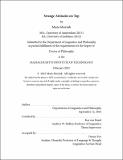Strange Attitudes on Top
Author(s)
Močnik, Maša
DownloadThesis PDF (2.482Mb)
Advisor
von Fintel, Kai
Terms of use
Metadata
Show full item recordAbstract
This dissertation investigates how attitude verbs of belief and desire engage with embedded material of a similar nature. Chapter 1 looks at the (cross-linguistically unusual) Slovenian existential doxastic attitude verb dopuščati (‘allow for the possibility’) and the embedding of epistemic modal verbs under it. Chapter 2 looks at the (overall puzzling) want and its Slovenian counterpart hoteti, and at their behaviour with respect to embedded doxastic attitudes, epistemic adverbs, and epistemic adjectives. Chapter 3 looks at the (cross-linguistically unusual) Koryak variable-force variable-flavour attitude verb ivək (‘think’, ‘allow for the possibility’, ‘say’, ‘suggest’) and at how its apparent bouletic flavour (‘wish’, ‘hope’, ‘fear’) is derived with the help of covert desiderative components inside the embedded clause. Attitude verbs have the standard role as quantifiers over possible worlds (Hintikka 1962), parameters of evaluation are assumed to contain a set of worlds called the information state (Yalcin 2007; a.o.), which the attitude verb modifies and passes to the embedded clause, while the epistemic modal base is taken to be ‘local’, forming a subset of the information state (Mandelkern 2017, 2019a). Some of the overarching theoretical contributions are the introduction of a new parameter of evaluation (‘selected state’), which is crucial in modelling embedding under non-universal attitude verbs, and a refined view of epistemic modality. Subjective epistemic modality is proposed to involve a second constraint on the shape of the modal base, whose effect is to strengthen embedded necessity claims and help derive the infelicities observed in chapters 1 and 2. We also address the connection between beliefs and desires in the context of various desire interpretations (wants in chapter 2, hopes and wishes in chapter 3).
Date issued
2025-02Department
Massachusetts Institute of Technology. Department of Linguistics and PhilosophyPublisher
Massachusetts Institute of Technology